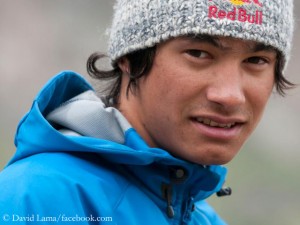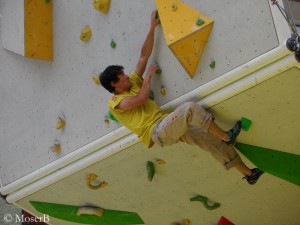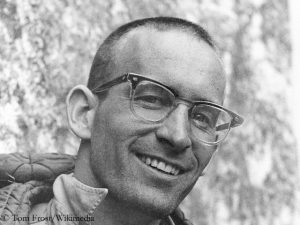Sport climbing becomes Olympic – joy and concerns
 I haven’t yet Olympic rings under my eyes. But that will surely change in the next two weeks because of the time difference between Rio de Janeiro and here. But when the next summer games are pending in four years in Tokyo, again in a different time zone, there will be an additional reason to change the daily habits: Sport climbing becomes Olympic in 2020. This was decided by the International Olympic Committee (IOC). “I think, it’s absolutely cool,” tells me German top climber Thomas Huber. “We have to be open to it. Sport climbing is worthy of being included in the Olympic program, because the competition has developed positively.” The IOC decision could send a signal to young people.
I haven’t yet Olympic rings under my eyes. But that will surely change in the next two weeks because of the time difference between Rio de Janeiro and here. But when the next summer games are pending in four years in Tokyo, again in a different time zone, there will be an additional reason to change the daily habits: Sport climbing becomes Olympic in 2020. This was decided by the International Olympic Committee (IOC). “I think, it’s absolutely cool,” tells me German top climber Thomas Huber. “We have to be open to it. Sport climbing is worthy of being included in the Olympic program, because the competition has developed positively.” The IOC decision could send a signal to young people.
Colourful spectacle
His younger brother Alexander and he themselves had participated in some competitions as young climbers, “rather poorly,” says the 49-year-old. But at that time climbing competition was in its infancy. “When I look at the Boulder World Cup today, I am thrilled: Colourful, spectacular routes, almost artistic. There’s a lot going on.” Indeed climbing, as the Alpine clubs mention, is adventure, but not only, says the older of the two Huber brothers: “It’s an attractive, serious sport. I also train like a competitive athlete when I want to go on expedition e.g. to Pakistan.”
“That’s nonsense!”
 Czech Adam Ondra, aged 23, one of the world’s best, if not the best sport climber currently, rejects the plan to combine all three disciplines – Lead, Bouldering and Speed Climbing – at the Olympics and to give medals to the best three of the overall standings. Thomas Huber agrees with him: “These are different disciplines. You cannot lump everything together. That’s nonsense! If the officials do that, they haven’t understood what’s climbing. In this case forget about that.”
Czech Adam Ondra, aged 23, one of the world’s best, if not the best sport climber currently, rejects the plan to combine all three disciplines – Lead, Bouldering and Speed Climbing – at the Olympics and to give medals to the best three of the overall standings. Thomas Huber agrees with him: “These are different disciplines. You cannot lump everything together. That’s nonsense! If the officials do that, they haven’t understood what’s climbing. In this case forget about that.”
Turning away from the essence
 David Lama has a more fundamental problem related to sport climbing at the Olympics. The 26-year-old top climber from Austria was a very successful athlete when he was a teenager, but then left the climbing competitions to concentrate completely on alpinism. Climbing, says David, “developed from man’s urge of discovering, from the motivation to climb mountains and to get into adventure. That is the essence of climbing, and in this form, there are still no rules.” However, clear rules need to be introduced to guarantee a fair competition, says Lama. For that reason alone, competition climbing had to distance from “real climbing”.
David Lama has a more fundamental problem related to sport climbing at the Olympics. The 26-year-old top climber from Austria was a very successful athlete when he was a teenager, but then left the climbing competitions to concentrate completely on alpinism. Climbing, says David, “developed from man’s urge of discovering, from the motivation to climb mountains and to get into adventure. That is the essence of climbing, and in this form, there are still no rules.” However, clear rules need to be introduced to guarantee a fair competition, says Lama. For that reason alone, competition climbing had to distance from “real climbing”.
“Apples and pineapples”
 Lama believes that the sport will distance even further from its essence after it will have become Olympic: “But is that bad? As long as we are aware that a competition has never reflected and will never reflect the basic idea of climbing, it is neither good nor bad. It simply doesn’t matter.“ It is difficult to compare apples and oranges, says David: “If I myself had to make the decision, I would clearly vote against the Olympics Games, so that the climbing DNA won’t be further diluted in competion climbing. Otherwise the appropriate comparison would soon be between apples and pineapples.”
Lama believes that the sport will distance even further from its essence after it will have become Olympic: “But is that bad? As long as we are aware that a competition has never reflected and will never reflect the basic idea of climbing, it is neither good nor bad. It simply doesn’t matter.“ It is difficult to compare apples and oranges, says David: “If I myself had to make the decision, I would clearly vote against the Olympics Games, so that the climbing DNA won’t be further diluted in competion climbing. Otherwise the appropriate comparison would soon be between apples and pineapples.”








